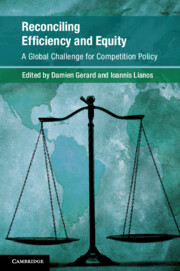
-
Select format
-
- Publisher:
- Cambridge University Press
- Publication date:
- 29 April 2019
- 09 May 2019
- ISBN:
- 9781108628105
- 9781108498081
- 9781108702881
- Dimensions:
- (228 x 152 mm)
- Weight & Pages:
- 0.79kg, 474 Pages
- Dimensions:
- (229 x 152 mm)
- Weight & Pages:
- 0.7kg, 476 Pages
- Subjects:
- Law and Economics, Law, Comparative Law, Competition Law
You may already have access via personal or institutional login- Subjects:
- Law and Economics, Law, Comparative Law, Competition Law
Book description
Due to the growing influence of economics and economists in competition law and policy discourse and the internationalization of antitrust, the equity versus efficiency trade-off debate has played a defining role in the transformation of the dominant paradigm governing competition law enforcement since at least the 1970s. The debate remains crucial today as issues of economic inequality and its interaction with efficiency become of central concern to policy and decision-makers in competition law, as well as in other spheres of public policy. Despite their central role in the grammar of competition law on the global plane, the intellectual underpinnings of the interactions between 'equity' and 'efficiency' in the context of competition law have never been examined in-depth. This book aims precisely to fill this gap by discussing new approaches in understanding the role of efficiency and equity concerns in competition law.
Reviews
'This new book entitled Reconciling Efficiency and Equity by Damien Gerard and Ioannis Lianos is a most welcome publication from Cambridge University Press (CUP). Its purpose is in the sub-title - a global challenge for competition policy coming as it does from CUP’s series on global competition law and economics policy.'
Source: Barrister Magazine
Contents
Metrics
Altmetric attention score
Full text views
Full text views help Loading metrics...
Loading metrics...
* Views captured on Cambridge Core between #date#. This data will be updated every 24 hours.
Usage data cannot currently be displayed.
Accessibility standard: Unknown
Why this information is here
This section outlines the accessibility features of this content - including support for screen readers, full keyboard navigation and high-contrast display options. This may not be relevant for you.
Accessibility Information
Accessibility compliance for the PDF of this book is currently unknown and may be updated in the future.


